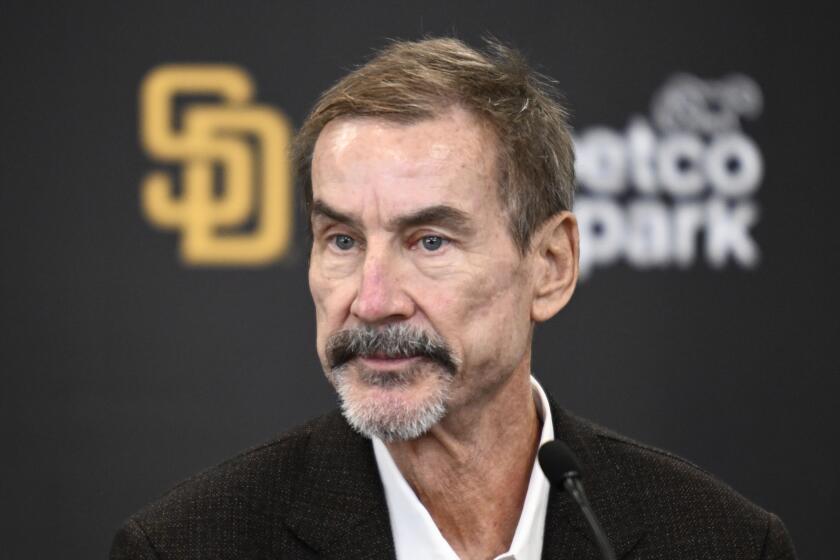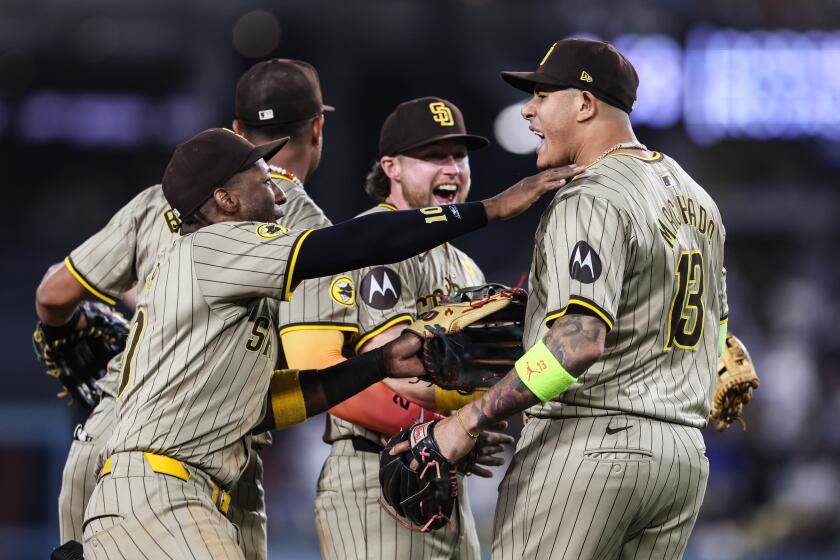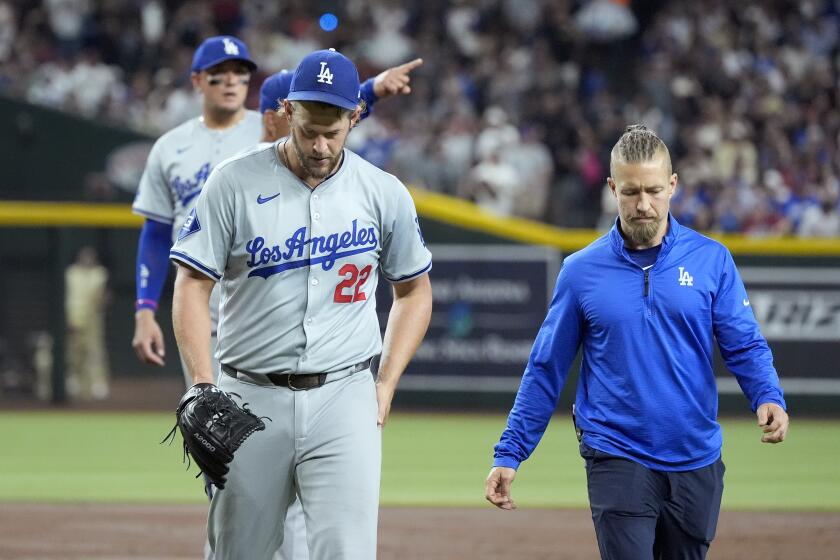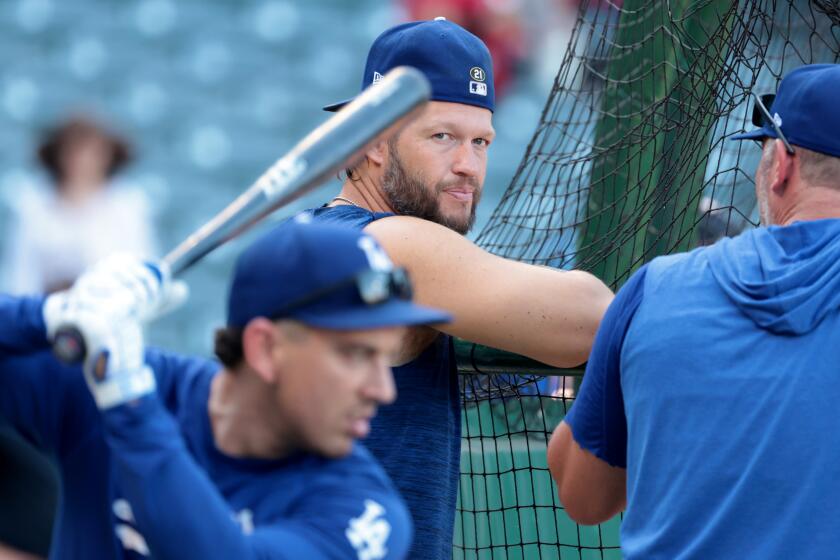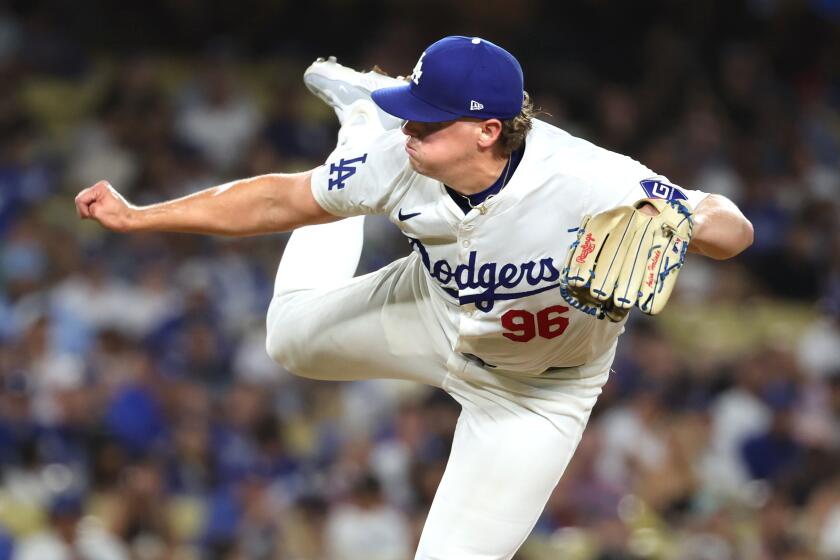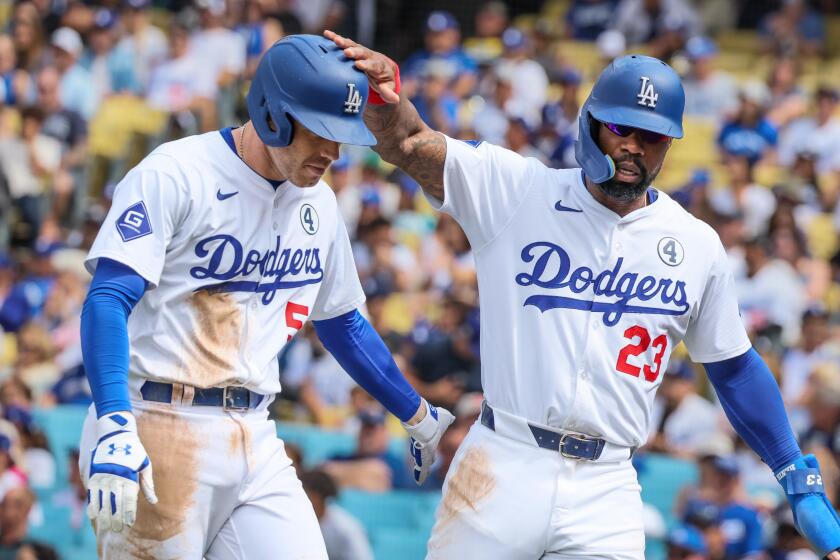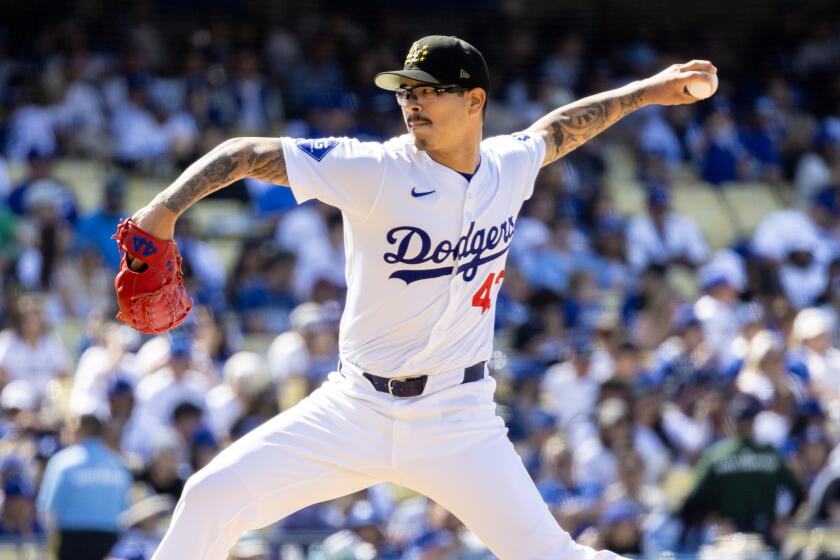Minor league lifer John Shoemaker has major impact on Dodgers organization
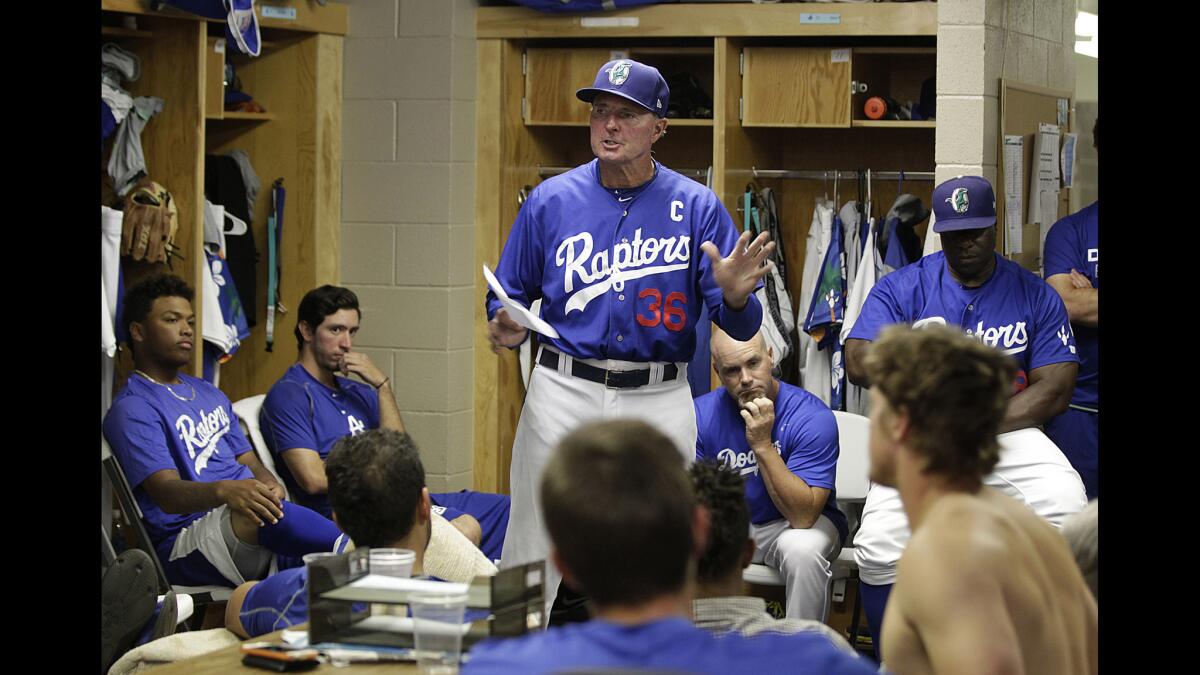
Ogden Raptors Manager John Shoemaker (center) talks to his players before a game against Montana on July 17.
His day begins in darkness.
When John Shoemaker shuffles into the tiny clubhouse tucked behind the left-field wall at Lindquist Field at 8:30 a.m. to begin another chapter in his 39th consecutive season in the Dodgers minor leagues, he fumbles around folding chairs, lockers, and a gently heaving body under a blanket on a couch.
“You don’t want to turn on a light because you never know who might be sleeping in here,” he says.
When Shoemaker reaches a closest-size office, he flicks on an overhead bulb and squeezes behind a desk to begin work as manager of the rookie league Ogden Raptors. It is 10 1/2 hours before his team will host Great Falls, yet he pulls on his uniform pants and a blue Dodgers T-shirt, and puts on his game face.
“Got a lot to do,” he says.
There might be a uniform that needs washing. Maybe some towels that need drying and folding. A floor that could use vacuuming. There might be a pitcher showing up early to ask advice about a girlfriend. Maybe an infielder will need to be informed about his release, at which point the crying kid will thankfully accept the tissues that Shoemaker conveniently keeps under his desk.
A rumpled figure appears at his door. It is a clubhouse attendant who has wrangled a key to the upstairs concession stand for moments like this. He hands Shoemaker a giant paper cup filled with a bubbling greenish liquid, the first of several cups he will consume today.
“Gotta have my Mountain Dew,” Shoemaker says.
He sets the drink on the floor next to stacks of boxes containing 27 dozen rubbed-up baseballs he keeps for emergencies. He then pulls out tonight’s lineup card and begins to fill in names of players who are still scattered about this small mountainside town in deep sleep.
If there was a Dodgers Hall of Fame, there could be an entire room devoted to John Shoemaker’s lineup cards.
After spending four years as a Dodgers minor league infielder in the late 1970s, Shoemaker immediately joined the minor league staff, and in 35 ensuing years has forged a record unmatched in the history of Dodgers player development. In his 22 years as a minor league manager, Shoemaker has tutored a Hall of Famer, Cy Young Award winners and assorted Dodgers greats, his class list including Pedro Martinez, Clayton Kershaw, Eric Gagne, Eric Karros and Adrian Beltre.
His impact has been so enduring, he not only managed Dodgers All-Star center fielder Joc Pederson, but also coached his father Stu. His reach has been so deep, the winning pitcher for his first minor league managerial win was Ramon Martinez. And, oh yeah, just for grins, he once coached a Vero Beach eighth-grade basketball championship team led by this giant center named Prince Fielder.
“The tree of baseball players that have grown from Shoe’s influence is endless,” says Dodgers catcher A.J. Ellis, who credits Shoemaker with helping save his career in 2007. “It’s amazing how many people’s lives he has touched.”
In winning more than 2,500 minor league games, his gaunt frame and tight grin decorating every Dodgers outpost, Shoemaker has fulfilled countless dreams by sending numerous individuals of varied skill levels to the major leagues, with one glaring exception.
Himself.
Despite spending nearly four decades as the rock of the foundation for the Dodgers major league team, he has not spent a single day there as a full-time member of the Dodgers. He has been in their dugout for three separate Septembers as a late-season addition in honor of his minor league work, but when those seasons ended, he was quickly sent back to the bushes.
From Vero Beach, to San Antonio, to Yakima, to Great Falls, to Savannah, to Jacksonville, to Las Vegas, to Great Lakes, to Ogden, Shoemaker has worked in seemingly every Dodgers home but the one coveted most. He has developed millionaires while doing a job for which the average salary is $50,000-$75,000 a year. He has been the genesis for dozens of headlines that never included his name. He has created countless moments that he can only watch from afar.
“People aren’t aware of him because he lurks in shadows doing his job without wanting any publicity or pat on the back,” says Dan Evans, a former Dodgers general manager who brought Shoemaker to the big leagues for a couple of weeks at the end of the 2003 season. “He’s just not that guy.”
Shoemaker, 58, has had to watch while not only his players but also his co-workers made the major leagues, as he has taught alongside future big league managers Mike Scioscia, Ron Roenicke, Jerry Royster, Terry Collins and Kevin Kennedy.
“I think he probably suffered from being such a good instructor and coordinator,” Evans says. “He would only impact 25 guys in the major leagues, while he can impact dozens of people in the minor leagues.”
If Shoemaker thinks about it, he doesn’t say it. If he is bitter, he doesn’t show it. But he wants you to know that he hasn’t given up on the major leagues. With some of baseball’s most creative minds now running the Dodgers, he believes that suddenly it wouldn’t be so strange to bring an minor league lifer to Chavez Ravine. He’ll never give up believing it could be him.
“I believe I can still get that call,” Shoemaker says quietly. “For a long time, I thought I didn’t have a chance to become a big league coach because I didn’t have the resume, I was never a big player or a big star. But I really think that’s changing. I see a small sliver of light.”
He says he has loved the Dodgers too much to ever consider moving to an organization that would offer more upward mobility. It is his ability to impart this love to impressionable young players that apparently makes him so valuable right where he is.
“I feel the job that I have at this moment is the most important job in the organization, that’s how I operate,” he says. “If I never went to the big leagues as a regular coach, I wouldn’t think I was cheated. This is baseball. This is teaching and developing young men. How can anyone think I was cheated?”
He smiles and nods toward a large book on a shelf next to his door. It is a guest book for a wedding. It turns out, the previous day, around noon, starting pitcher Dennis Santana decided to get married on the field. This sort of wonderfully wacky thing happens often in John Shoemaker’s world, only this time it was a little more problematic, as Santana was scheduled to be that night’s starting pitcher.
“I hope your outing lasts longer than your ceremony,” Shoemaker told the beaming groom.
Barely. An understandably distracted Santana later allowed two runs in four innings in a 6-2 loss to Great Falls. After which, Shoemaker hugged him anyway.
“This is where they learn,” Shoemaker says.
::
Early in the morning before every home game, with the stiff gait of an old-school baseball guy, John Shoemaker walks several blocks to Lindquist Field from the aging downtown hotel suite he shares with Ogden pitching coach Bobby Cuellar. He walks because he is spending the summer without a car. He figures a guy who lives at the ballpark doesn’t need one.
He always carries a Dodgers backpack. He always stops at Subway for a chicken breast sandwich that costs $4.37, and he always has a $5 bill ready.
The view beyond the outfield fence at Lindquist Field is a stunning combination of mountain peaks and LDS temple, but Shoemaker never notices, heading straight to that darkened clubhouse to continue a career that has been quiet from the beginning.
Shoemaker first joined the Dodgers after being drafted as a middle infielder in the 35th round in 1977 out of Miami of Ohio. He was also drafted by the Chicago Bulls as a point guard, but he always knew his future was in baseball, and even though he was only good enough to play four minor league seasons, his release was accompanied by a Dodgers offer to start coaching. He quickly accepted, and thus never spent one day out of the organization.
“I was never blessed with great speed, great arm or great power,” he said. “But I liked to teach.”
Ogden is about a half-step above the bottom rung of the Dodgers’ minor league system, and many of his players are in professional baseball for the first time, so Shoemaker teaches as much real life as baseball. He once counseled a player while outside, the kid’s car was being repossessed. He has visited a player in jail. He has comforted a player who lost a child. A frightened player once came to him before a game and admitted that he had unknowingly been dating a married woman. Shoemaker pushed aside the lineup card and said, “I’ve got two pieces of advice — don’t answer your phone and stop dating the girl.”
Shoemaker is such an effective mentor that one player still calls him on Father’s Day, saying, “You treat me like my father would treat me if I had one.”
He’s a father figure filled with sentiment. He holds a 6 p.m. meeting before every home game to talk about Dodgers history. After every win, he gives out a game ball, like football coaches do.
Something else happens after those victories that is not so pretty. Shoemaker gives high fives with his left arm because he can barely lift his right arm above his head. All these years of pitching batting practice have shredded his shoulder. This is part of both the personal and professional price he has paid.
Through all the years and towns, he has suffered through prolonged absences from Jackie, his wife of 33 years, and daughters Kayla and Jenna. His eyes get misty when talking about them. He calls often on his ancient flip phone, although texting, not so much.
It should figure that Kayla dated one of Shoemaker’s players in Jacksonville, a pitcher named Casey Hoorelbeke whom she later married.
“I don’t think many people can say their husband routinely showered in the same room as their father,” Kayla recalls with a laugh.
A fresh appreciation for Shoemaker arrived this spring with Andrew Friedman’s new Dodgers regime. Every day of spring training, the new guys noticed Shoemaker’s work habits and influence.
“We were literally behind his back, gushing over him, saying this is exactly what we want out of our staff members,” said Gabe Kapler, the Dodgers’ new director of player development.
The idea that Shoemaker would be forgotten again at the start of the season was too much for Kapler and his staff to take. So in early July officials flew to Ogden and, in that tiny clubhouse in front of cheering players, they bestowed upon Shoemaker an honor unmatched in all of minor league baseball. They put a “C” on his jersey, where it will remain for the rest of his career. He will forever be the Dodgers’ Captain of Player Development.
::
His day ends in light.
Fifteen hours after he stumbled into a darkened clubhouse, John Shoemaker jogs into a loud and jubilant clubhouse after a kid named Gage Green comes off the bench to hit a walk-off homer in the bottom of the ninth inning in a victory over Great Falls.
Shoemaker jumps on a table and turns up the rap-blaring stereo. He shouts for his players to stop dressing and eating and wait for the hero. Then, when Green walks through the door, Shoemaker tosses him the game ball and the room erupts in cheers.
“It’s not quite like the Kirk Gibson shot in 1988, but it’s a baseball game no matter where it is,” said the Dodgers’ human fist pump, their perpetual MVP, the man who continues to move blue mountains while standing perfectly still.
Follow Bill Plaschke on Twitter @billplaschke
More to Read
Are you a true-blue fan?
Get our Dodgers Dugout newsletter for insights, news and much more.
You may occasionally receive promotional content from the Los Angeles Times.




